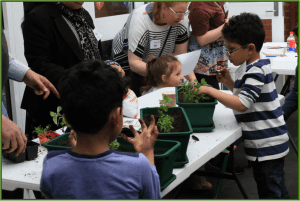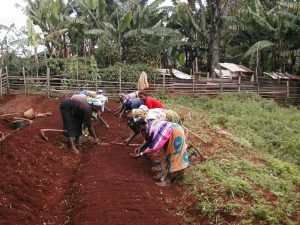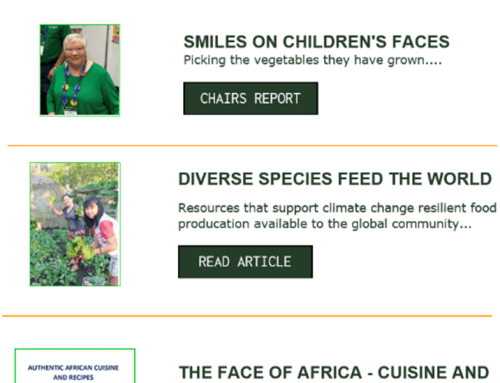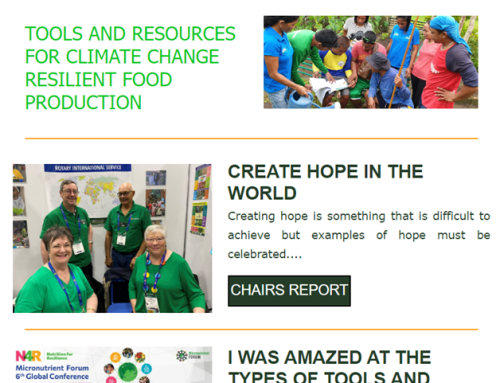Food Sustainability. Multiculturalism. Community Bonding – all in this edition
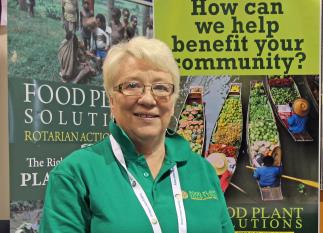
Message from the Chair
In the time it takes you to read this newsletter, 100 children will die from malnutrition.
Just imagine for a second that you were the parent of one of those children…. Each of us can improve this statistic by ‘planting a seed for change’ in your community and in overseas communities where you have a project.
Recently I was privileged to attend a workshop organised by the Rotary Club of North Hobart and the Campbell St. Primary School, for new Tasmanian’s and their families – a ‘Fresh Food for Families’ workshop. This was based on a trial workshop held in 2018, when out of this a ‘how to’ booklet was developed to enable groups to replicate the workshop, anywhere in the world. Since then in Tasmania there have been 5 workshops – one with new Tasmanian’s from Nepal, one with families from Ethiopia, one with families from Thailand and two involving families from various countries. At the Campbell St. Primary School one, the children all planted ‘a seed for change’. They took home a trough they had planted with seedlings, paper planting pots with seeds, tiny seedlings and a gardening calendar for Tasmania, showing what to plant in what season.
Imagine if every Rotarian took on the challenge to ‘plant a seed for change’ in their community, what a difference that would make. Perhaps you could help people in high rise communities’ plant in troughs, which could be put outside their doors and grow food for their family. Or, you could run a workshop in the local school with your club or, in a community you belong to.
Bruce French AO, developed the Food Plants International database to rid the world of malnutrition. We, at Food Plant Solutions Rotary Action Group are doing our bit towards that goal. What are you going to do? Remember, Rotary Opens opportunities.
Yours in Rotary
PDG Una Hobday OAM, PHF
Chair – Food Plant Solutions Rotary Action Group
Editor’s note: The Campbell Street Primary school workshop was highlighted in the evening news, which can be viewed at: https://www.youtube.com/watch?v=dNXsayxEPUw&feature=youtu.be&t=299&fbclid
Impact and Feedback – FPS Making a Difference
Cataloguing the world’s edible plants and using that information to transform lives
Recently Food Plant Solutions was featured on ABC’s Landline, with the segment explaining our work and what we are achieving. https://www.abc.net.au/landline/world-class:-cataloguing-the-worlds-edible-plants/12586302
Kenya:
“Hello. I teach preventive health to community health workers in Kenya. This document will be a huge help to me as I help Kenyans improve their diets. Many thanks for your work”
A simple message that reflects both how our work is valued and the reach FPS continues to extend.
Tanzanian Program Partner: (verbatim)
“I remember your peace of advice that school gardens can be used as school Laboratories for science subjects. Your advice has been able practically achieved at Harambee secondary school as I have been able to transform the knowledge from buildings to gardens for simplifying the complexity of science subject from ideal to reality .
As a member of the Rotary club, I believe that, students are very bing party of the community I work from. Having students with correct knowledge on nutrition will enable significant changes of the whole society since they are ambassadors to there community.
Regards to the Food guide, Actually, exceptional and esteemed appreciations go to you and all members who devoted their time for preparing the food guide. We have been able to use the food guide for choosing crops to plant and through the guide we have been able to understand a lot of knowledges of the nutritional deficiencies in the student’s and teacher’s diets.”
Food Sustainability. Multiculturalism. Community Bonding.
The Fresh Foods for Families workshop is designed to help families to grow, nurture, harvest and prepare vegetables for nutritious meals. So, while food sustainability is the primary reason for conducting these workshops, as additional outcomes community bonding and multiculturalism are celebrated. The Rotary Club of North Hobart workshop was held at a local primary school, with the enthusiastic support of the principal. The school community is drawn from about 20 countries, most of which were represented at the workshop. Most of the 40 attendees were children, seeding their interest in gardening for their futures. It was heart-warming to see parents who hadn’t before met take the opportunity to introduce themselves to others, further adding to their sense of community belonging. The workshop was enthusiastically received. Many attendees, as they left, came to thank the organisers, taking home their bags of planted seedlings, samples and information. Not only did experienced gardeners report that they had learned, one parent said, ‘This is the best workshop I have been to, and if we had more in Tasmania, we wouldn’t be going without food.’
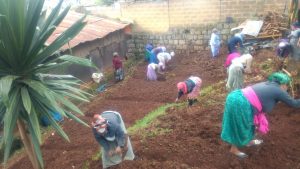
Education and Development in Ethiopia
Nutrition 4 Education & Development (N4ED) is an Ethiopian nonprofit organization whose mission is to improve children’s nutrition and ensure their full cognitive and physical development. The collaboration between N4ED and FPS started in 2019. Most of 2020 was marked by the adaptation of the field guides provided by FPS to the local language in order to make the guides more applicable to the Ethiopian’s community.
N4ED’s urban gardening sub-program was planned to start on April 2020 under a larger scope community project but due to COVID-19 all of N4ED’s community projects were suspended for 5 months and replaced by special emergency response programs. One of these included collaboration with a local organization called Timret Le Hiwot Ethiopia (TLHE) who started a new program with urban gardening activities. The urban gardening program began in June and reaches 200 underprivileged women. N4ED gives technical support for this program by using the information provided by Food Plant Solutions (FPS) in the field guide ‘Potentially Important food plants of Ethiopia’. FPS has provided both a field guide and a pictorial publication, which is being translated. Once translated this will be used in the second round and distributed to the participants.
What Grows in Arid, Barren Regions? – Bruce French AO
While we had coffee after church, a friend was showing me photos of her trip to the Himalayan region in Northern India. What intrigued her were the villages in a seemingly arid, barren region. How did they survive? What did they eat? My suggestion was to type in “Himalayas” in our database. That would have given her 2,732 choices for edible species. It she wanted to be more specific she could type in both “Himalayas” and “Arid” and this would reduce it to 247 choices. As I walked home, I started thinking, “What about these tough and arid and unproductive zones?”
On a global scale there are over 2,000 edible plant species adapted to arid zones. If they are not mountainous regions in the Himalayas, our immediate thoughts go to irrigation. But this is unrealistic and impractical for the rural poor in most of these locations. I have seen women carry water for 2 hours to meet their family’s daily needs.
Closer to home, there are 830 edible plant species suited to arid areas in Australia. We manage to forage some desert raisins, kurrajongs, acacia seeds and Kakadu plum but haven’t really explored arid and desert food plants for our own country. We prefer to grow wheat further and further into hot regions that simply increases the gluten level making us the world’s leaders in coeliac problems.
School Gardens Thrive in Vietnam – Rebekah Windsor, AOG World Relief Vietnam
In Central Vietnam, one of the most significant challenges we’re seeing as a result of the COVID-19 pandemic has been in the areas of education and nutrition, with two full lockdowns since January and some schools closed for almost five months. This has translated into unequal education and nutrition experiences for the children in our region, particularly for those with restricted access to internet connections, computers and the availability of food to nourish their bodies throughout the school day like they would typically get at school.
Thankfully, although schools have been closed, the many gardens we have established since our partnership first began with Food Plant Solutions some years ago are thriving and providing for the teachers, staff and students. We focus our gardens in schools, particularly kindergartens and primary schools as they have the greatest connection point in a given community with a highly visible and measurable impact. They are also more sustainable as they have kitchen with school lunches prepared daily from the produce grown in the gardens tended by the children. In this way, many children benefit from the one garden as do the staff and the parents/families.
We were speaking to one of the principals of a kindergarten where we had set up a garden less than 18 months ago, she reported the impact the simple garden had made for the 132 children enrolled. Since we first created the garden, it has grown steadily and provided ample produce for the students and staff. So much so that the school has been able to sell the excess produce in the area and used those funds to buy other nutritious ingredients to add to the school-day meal like eggs, fish and meat.
Seeing the benefits of the garden including the improvement of the student’s overall nutrition and well-being, the school has worked slowly to increase the size and variance of crops available. Even though schools have been closed sporadically due to lockdown, staff have remained to tend the gardens and continue to use the produce to benefit the students and their wider community.
A Plea From Cameroon
We recently received the following message from our program partner in Cameroon:
“For us here, the crisis keeps intensifying and women and children are greatly affected. Recently 8 children were killed at school by armed men, their only crime was that they when to school. We introduced the use of a home garden as an alternative solution to improve children’s nutrition and combat hunger. We are using some of your proposed plants like soya beans. So far 5 women have benefitted and done so well. There have been challenges in getting funding and we keep trying and hope help comes. domestic violence and rape are increasing by the day, women, and deeply affected. we also introduce some other projects to provide psychosocial support to those we can reach and fight hard day by day.” Sic
Food Plant Solutions needs your support so that we can continue to provide educational materials to our program partners. https://foodplantsolutions.org/donate/

